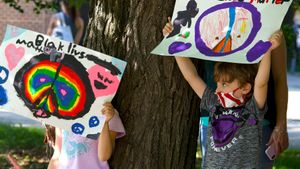Hostages remaining from the Israeli-Hamas conflict pose significant emotional and political challenges, with Israeli leaders and families of the captives intensifying their calls for action. With the expiration of hope for diplomatic resolution and growing public agitation, the situation continues to evolve amid harsh realities.
Israel recently commemorated one year since the first hostage deal began, which freed 80 individuals, including women and children, held by Hamas. During this period, the Israeli government has faced criticism for not doing enough to facilitate the release of the remaining 101 hostages, many of whom are believed to be suffering severely under deteriorated conditions. Speaking at his residence, President Isaac Herzog underscored the urgency by stating, "If we do not bring them home, we will be left with a bleeding, open wound." Herzog emphasized the detrimental impact on the collective psyche of Israeli society if these hostages remain unaccounted for.
Family members of the hostages have staged regular demonstrations, invoking the memory of those lost and urging the government to expedite any possible agreements. Public protests have drawn thousands, highlighting the emotional turmoil faced by parents and relatives awaiting news about their loved ones. A particularly poignant rally unfolded as the family of U.S.-Israeli hostage Hersh Goldberg-Polin shared their grief following his murder by Hamas militants earlier this year.
The Israeli military's uncertainty about the fate of many hostages continues to loom as Hamas has made disturbing claims about the status of captives. The terror group assertively announced the death of one female hostage, intensifying the fears of families who are becoming increasingly desperate.
Talks of negotiations have not yielded fruitful results, as Prime Minister Benjamin Netanyahu has refrained from withdrawing Israeli forces from Gaza, which Hamas demands as part of any ceasefire agreement. These stalled discussions have led to increased tensions and speculation about future negotiations. Netanyahu reportedly believes he may receive more favorable terms from future U.S. administrations.
Former hostages who were released during the ceasefire last year have voiced their outrage over the lack of urgency to secure additional releases, expressing sentiments of helplessness and despair. Gabriella Leimberg, one such former captive, passionately reminded attendees at the recent commemoration event, "Everything has already been said, and now action is required. We don’t have any more time." Her sister and mother were also released, making her acutely aware of the need for decisive action.
Calculations surrounding potential deals have become complicated by successive revelations of grueling conditions faced by the remaining hostages. Anne Hagar Butz, another former hostage, illustrated the brutal captivity endured inside the tunnels of Gaza by stating, "The suffocation, the terrible humidity, the stench — these sensations still envelop us." Her comments resonate deeply with families, instilling fears of irreversible trauma for their missing loved ones.
Despite the challenges, protests for the remaining hostages continue to gain momentum. Einav Zangauker, whose son is still held, harshly criticized the government, stating: "We have a prime minister who has failed to bring my son home for over a year." Her statements spotlight the growing discontent among families who feel neglected and abandoned, urging more dramatic action to secure their loved ones' freedoms.
The Israeli government is also facing international scrutiny. Following claims from Hamas, Netanyahu revealed investigations were underway to verify the legitimacy of released images purportedly showing the corpse of one female hostage. "We're committed to bringing back all our hostages, including those who are dead," Netanyahu stated, signaling the depth of the emotional commitment to the situation and its impact on national consciousness.
Activists note the desperation felt by families whose hopes seem to continually retreat. The sentiment underlines not just personal sadness, but collective grief, as stated by one family member: "There are too many parents like us who have lost their children." Calls for no one to be forgotten resonate both within and beyond Israeli borders, providing insight for the international community.
The comparison between past and present conditions for hostages is stark; from hopeful releases during the ceasefire to enduring blind acceptance of stagnation, the evolution of the situation paints a bleak picture historically and presently. The hostage crisis fundamentally affects Israeli society's mental and emotional state, demanding both immediate and sustained attention.
With multiple sides urging for increased international intervention, including from mediators like Qatar and the United States, observers remain skeptical of progress. Qatar recently suspended its mediatory role, adding to existing frustrations and stagnation.
Israeli officials initially hoped the killing of Hamas' leader, Yahya Sinwar, might push the group to negotiate more earnestly. Instead, Hamas appears to have consolidated its refusal to engage on terms acceptable to Israel, perpetuating hostilities and leading to increased uncertainty about the hostages’ fate.
Tensions remain volatile on the ground as exchanges of fire continue between Israel and militant groups, including Hezbollah, presenting immediate dangers and complicities for restoration of peace. Public opinion is increasingly restless, demanding swift responses from the government. The notion of sacrifice for security is deeply ingrained and contested within Israeli culture, creating dynamic tensions between community needs against operational strategies.
While families of hostages wait desperately for news, the broader narrative surrounding this conflict reveals entrenched historical grievances rather than mere incidents of violence. Each hostage's story intertwines with persistent scrutiny of political leadership, military strategy, and public sentiment. Mobilizing support across various factions and amplifying calls for resolution of this humanitarian crisis remains pivotal.
The plight of hostages continues to heighten; advocates call for accountability from leadership to act decisively before the situation deteriorates even more. Amid continued violence and loss, Israeli society faces unyielding pressure. The mental toll carried by families and hostages alike is juxtaposed with public demands for prompt and humane resolutions to the situation, setting the stage for potential policy shifts.
With the specter of uncertainty looming large over the conflict, Israeli leaders must grapple with opposing pressures from the public and those who are held captive. The conclusion lingers—will timely actions facilitate freedom for hostages, or will memories of those lost and suffering propel continued turmoil? The outcome remains uncertain, but the calls for action remain pivotal as the plight of hostages and their families take center stage.



